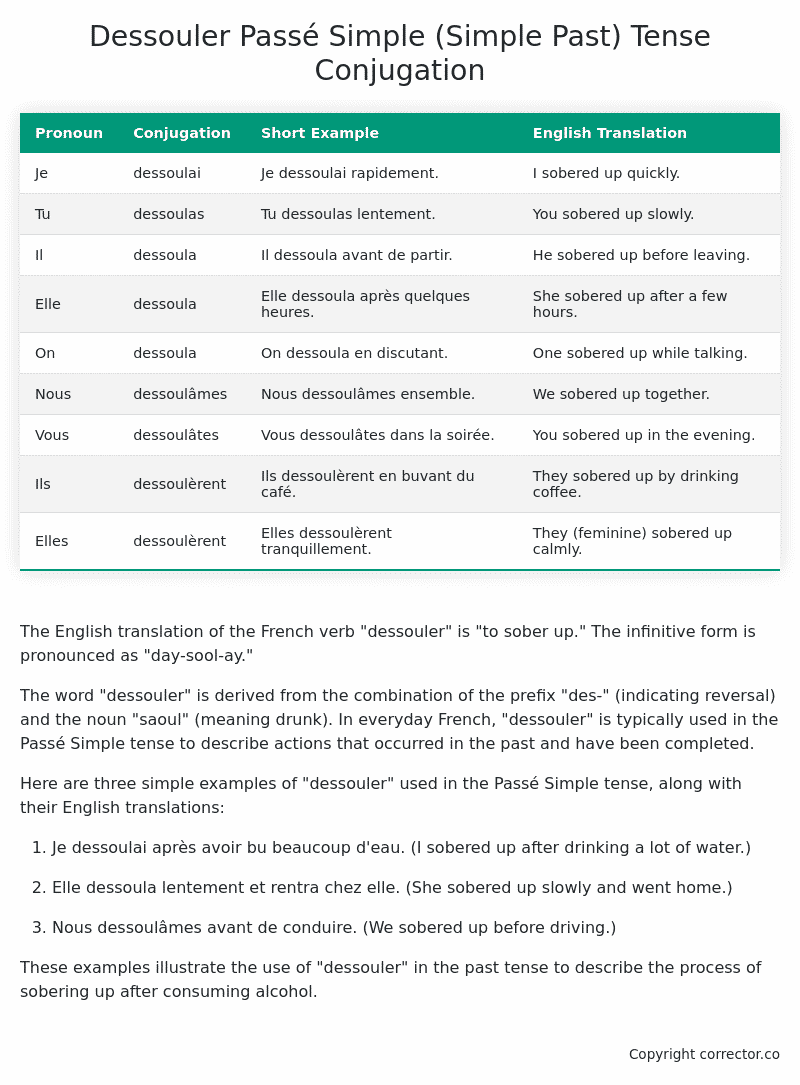Passé Simple (Simple Past) Tense Conjugation of the French Verb dessouler
Introduction to the verb dessouler
The English translation of the French verb “dessouler” is “to sober up.” The infinitive form is pronounced as “day-sool-ay.”
The word “dessouler” is derived from the combination of the prefix “des-” (indicating reversal) and the noun “saoul” (meaning drunk). In everyday French, “dessouler” is typically used in the Passé Simple tense to describe actions that occurred in the past and have been completed.
Here are three simple examples of “dessouler” used in the Passé Simple tense, along with their English translations:
-
Je dessoulai après avoir bu beaucoup d’eau.
(I sobered up after drinking a lot of water.) -
Elle dessoula lentement et rentra chez elle.
(She sobered up slowly and went home.) -
Nous dessoulâmes avant de conduire.
(We sobered up before driving.)
These examples illustrate the use of “dessouler” in the past tense to describe the process of sobering up after consuming alcohol.
Table of the Passé Simple (Simple Past) Tense Conjugation of dessouler
| Pronoun | Conjugation | Short Example | English Translation |
|---|---|---|---|
| Je | dessoulai | Je dessoulai rapidement. | I sobered up quickly. |
| Tu | dessoulas | Tu dessoulas lentement. | You sobered up slowly. |
| Il | dessoula | Il dessoula avant de partir. | He sobered up before leaving. |
| Elle | dessoula | Elle dessoula après quelques heures. | She sobered up after a few hours. |
| On | dessoula | On dessoula en discutant. | One sobered up while talking. |
| Nous | dessoulâmes | Nous dessoulâmes ensemble. | We sobered up together. |
| Vous | dessoulâtes | Vous dessoulâtes dans la soirée. | You sobered up in the evening. |
| Ils | dessoulèrent | Ils dessoulèrent en buvant du café. | They sobered up by drinking coffee. |
| Elles | dessoulèrent | Elles dessoulèrent tranquillement. | They (feminine) sobered up calmly. |
Other Conjugations for Dessouler.
Le Present (Present Tense) Conjugation of the French Verb dessouler
Imparfait (Imperfect) Tense Conjugation of the French Verb dessouler
Passé Simple (Simple Past) Tense Conjugation of the French Verb dessouler (You’re reading it right now!)
Passé Composé (Present Perfect) Tense Conjugation of the French Verb dessouler
Futur Simple (Simple Future) Tense Conjugation of the French Verb dessouler
Futur Proche (Near Future) Tense Conjugation of the French Verb dessouler
Plus-que-parfait (Pluperfect) Tense Conjugation of the French Verb dessouler
Passé Antérieur (Past Anterior) Tense Conjugation of the French Verb dessouler
Futur Antérieur (Future Anterior) Tense Conjugation of the French Verb dessouler
Subjonctif Présent (Subjunctive Present) Tense Conjugation of the French Verb dessouler
Subjonctif Passé (Subjunctive Past) Tense Conjugation of the French Verb dessouler
Subjonctif Imparfait (Subjunctive Imperfect) Tense Conjugation of the French Verb dessouler
Subjonctif Plus-que-parfait (Subjunctive Pluperfect) Tense Conjugation of the French Verb dessouler
Conditionnel Présent (Conditional Present) Tense Conjugation of the French Verb dessouler
Conditionnel Passé (Conditional Past) Tense Conjugation of the French Verb dessouler
Conditionnel Passé II (Conditional Past II) Tense Conjugation of the French Verb dessouler
L’impératif Présent (Imperative Present) Tense Conjugation of the French Verb dessouler
L’impératif Passé (Imperative Past) Tense Conjugation of the French Verb dessouler
L’infinitif Présent (Infinitive Present) Tense Conjugation of the French Verb dessouler
L’infinitif Passé (Infinitive Past) Tense Conjugation of the French Verb dessouler
Le Participe Présent (Present Participle) Tense Conjugation of the French Verb dessouler
Le Participe Passé (Past Participle) Tense Conjugation of the French Verb dessouler
Struggling with French verbs or the language in general? Why not use our free French Grammar Checker – no registration required!
Get a FREE Download Study Sheet of this Conjugation 🔥
Simply right click the image below, click “save image” and get your free reference for the dessouler Passé Simple tense conjugation!

Dessouler – About the French Passé Simple (Simple Past) Tense
Formation
Usage
Narration
Historical Context
Interactions with other tenses
Passé Composé
Imparfait
Conditional and Subjunctive
Summary
I hope you enjoyed this article on the verb dessouler. Still in a learning mood? Check out another TOTALLY random French verb conjugation!


